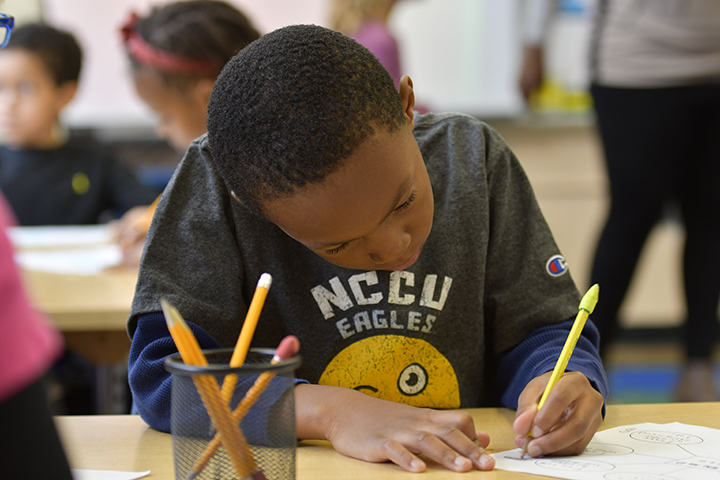NCTE member Mukkaramah Smith was interviewed for this post by freelance journalist Kimberly Fields.
Mukkaramah Smith, a 2020 corecipient (with Kaitlin Jones) of the NCTE Donald H. Graves Award for Excellence in the Teaching of Writing, isn’t your typical teacher with an expected classroom lesson plan.
Her classroom at A.J. Lewis Greenview Elementary in Columbia, Richland School District One, South Carolina, is her “village,” a place where she reconstructs societal and cultural influences. It is where she supports students not only in gaining knowledge but in developing high self-esteem and self-acceptance, and ensures they see themselves reflected in their education.
It became apparent to Smith while a undergraduate that the African American vantage point was being muted instead of embraced. So when she became a teacher 21 years ago, she felt it important to place emphasis on meeting her students of color where they are, humanizing their Blackness and heritage, and allowing students to be their authentic selves.
What does that look like exactly?
“Humanizing them is being organic,” says Smith. “When I say that I want children to be authentic, I want them to be who they are, including their language. [Children] come to school with [their] African American language and we try to change that language.”
Using What Children Bring to the Classroom
Smith believes in teaching children using what they already bring to the classroom: their habits of reading, writing, and speaking; their love of learning; and their family and community environments. She doesn’t alter their language or ideas, but instead uses them to ensure her students are proud of themselves and feel accepted as they are.
As a first-grade teacher, Smith has seen students develop feelings of inferiority or display a lack of confidence in their writing. She helps to combat this by allowing students to see themselves reflected in the literature they read and the subjects they study, and by giving them permission to just be. Smith says it is imperative not to be critical about what or how they are writing, but to validate their ideas and choices. These are ingredients for creating Black joy.
Black Joy in the Classroom
“That’s where Black joy starts,” says Smith. “You have to love yourself. You have to love your Blackness. You have to love the good, the bad, the grit, the grind.”
Black joy in the classroom involves teaching from the vantage point of who the students are. Smith has found that bringing in different kinds of literature written by and about African Americans allows her students to connect more and see themselves in the stories.
When it comes to empowering her students, Smith has found success in student-based projects, with ideas coming directly from students.
“I take a lot of cues from the children that I teach,” says Smith. “They talk about superheroes—well, let’s talk about the superheroes. And from that comes ‘let’s talk about those kings and queens,’ those African queens and kings that were. Let’s talk about the pharaohs.” She builds on what students know, because “that information, [that] knowledge is power.”
One project in particular was built out of appreciation for hair. She and her preservice teacher noticed that the students had a strong interest in hairstyles. They used this interest and incorporated it in various subjects—English language arts, science, and even social studies.
Making These Experiences Possible for All Students
Smith doesn’t want the experiences of empowerment, Black joy, authentication, or humanizing Blackness to end with her. She believes it is important for every teacher to make these experiences possible for all students of every race and cultural background.
One important thing that needs to occur, she says, is that teachers have to check their biases and understand that the classroom isn’t about them, but about the students they are teaching.
“Let the students be the subject,” says Smith. “Let them be the subject of what is going on and not the object.”
Kimberly Fields is a freelance journalist and editor and is CEO of The Write Place, LLC, based in Raleigh, North Carolina.
It is the policy of NCTE in all publications, including the Literacy & NCTE blog, to provide a forum for the open discussion of ideas concerning the content and the teaching of English and the language arts. Publicity accorded to any particular point of view does not imply endorsement by the Executive Committee, the Board of Directors, the staff, or the membership at large, except in announcements of policy, where such endorsement is clearly specified.
The NCTE Donald H. Graves Award for Excellence in the Teaching of Writing

 Mukkaramah Smith and Kaitlin Jones are the corecipients of the 2020 Donald H. Graves Award for Excellence in the Teaching of Writing.
Mukkaramah Smith and Kaitlin Jones are the corecipients of the 2020 Donald H. Graves Award for Excellence in the Teaching of Writing.
Mukkaramah Smith is a first-grade teacher at A.J. Lewis Greenview Elementary School in Richland School District One, South Carolina. She has worked as an educator for 25 years as a classroom teacher, lead literacy facilitator, department chair, coaching teacher for preservice teachers, and mentor. Mukkaramah is a board member for NCTE’s Professional Dyads of Culturally Relevant Teaching (PDCRT) program and also serves on NCTE’s Elementary Section Nominating Committee. Kaitlin Jones is a first-grade teacher at Rice Creek Elementary School in Richland School District Two, South Carolina. During her student teaching internship, she participated in the Urban Cohort of the University of South Carolina’s early childhood education program and collaborated with Mukkaramah Smith in developing culturally responsive instruction.
July 1 is the nomination deadline! Learn more about the Donald H. Graves Award for Excellence in the Teaching of Writing here.

